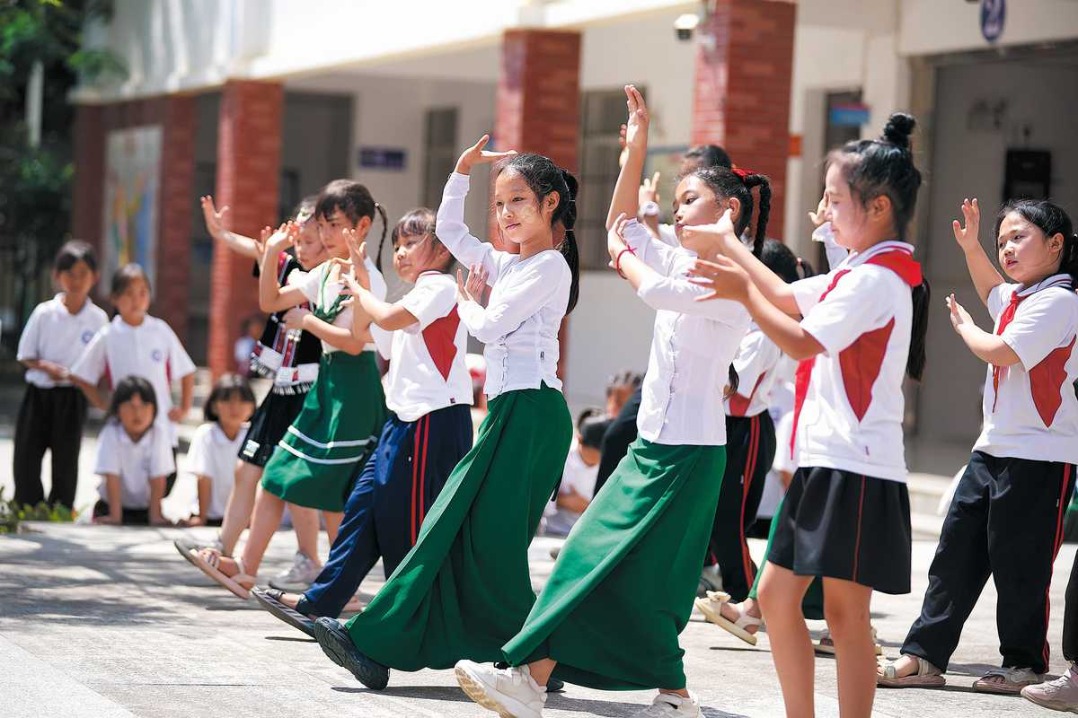Anhui Gujing Distillery attends Osaka Corporate Day event


Attendees at a Corporate Day event hosted by Anhui Gujing Distillery Co Ltd at Expo 2025 Osaka on Monday agreed that Gujinggong Liquor, a traditional Chinese liquor, holds strong potential as a medium for global dialogue, offering a unique way to share the depth of Chinese liquor culture and foster international connections.
Historical records indicate that in 196 AD, Cao Cao, a legendary warlord of the Three Kingdoms period (208-280 AD), presented Jiuyun Spring Liquor, a local specialty from his hometown of Bozhou in Anhui province, along with its brewing method, to Emperor Xian of Han. This act led to the liquor being named "Gongjiu", meaning "tribute liquor," as it became an offering to the imperial court.

This is the beginning of Gujinggong Liquor's storied brewing tradition, which has continued for more than 1,800 years. Its distillation method is recognized by Guinness World Records as the old-est documented spirit recipe.
"Chinese baijiu is not only a bridge for communication among Chinese people but also a potential vehicle for global dialogue," said Yan Lijun, executive vice-president of Gujing Distillery. "As a pioneer in the internationalization of Chinese baijiu, our company advocates for making baijiu a universal language and is committed to helping the world understand and fall in love with Chinese baijiu.

The company's core strategic product series, Original Vintage, is now exported to over 30 countries and regions. It has played a significant role in spreading the culture of Chinese baijiu and the local traditions of Anhui, contributing to the mutual learning and joint development of global liquor cultures, Yan said.
"Building on the inheritance of China's national intangible cultural heritage brewing techniques, our employees have innovated with the concepts of green brewing and intelligent manufacturing, empowering traditional craftsmanship with digital technology and writing a new chapter of harmony between humanity and nature with dedication," he said.
Since joining hands with the Anhui Pavilion at the 2010 Shanghai World Expo, Gujinggong Liquor has been a partner of the World Expo for six consecutive editions. It is also the only Chinese baijiu brand to have partnered with the China Pavilion for five consecutive expos.

At the Monday event, the company released a commemorative liquor to mark its partnership with the World Expo over six editions.
"The World Expo is not only a window showcasing China's development achievements but also a strategic platform for Chinese enterprises to enter the global market," said Luo Lei, deputy director of the China Pavilion at Expo 2025 Osaka.
"Thanks to the collective efforts of Chinese enterprises represented by Gujing Distillery, visitors to the China Pavilion have been able to witness Chinese brands with international standards, contemporary character, and regional distinction stepping onto the global stage — seeing a vibrant, confident and open China," Luo said.
He expressed hope for everyone to seize the opportunities brought by the World Expo, build confidence in taking Chinese brands global, further enhance brand awareness, and open new chapters in global business collaboration.
Luo Yuquan, director of the China Cultural Center in Tokyo, also emphasized that the World Expo is not only a feast of science and culture but also a bridge that connects the world and promotes co-operation.
He stressed the importance of cultural exchange as a bond for enhancing mutual understanding and deepening friendships.
"As a cultural ambassador of Chinese baijiu, Gujing Distillery aims to make baijiu a 'language of the world'. We are pleased to see that after years of dedicated efforts, more and more Japanese people are beginning to understand Chinese culture and appreciate the charm of China through Gujinggong Liquor," Luo Yuquan said.
He expressed a strong commitment to fostering Sino-Japanese exchanges through cultural engagement, aiming to transform cultural soft power into a driving force for regional prosperity.
Hikaru Nagano, executive liaison director of the International Relations Bureau of the Japan Association for the 2025 World Exposition, noted that the Japanese name for the World Expo is Bankoku Hakurankai, which literally translates to "exposition of 10,000 countries". While the phrase suggests a vast number, it more broadly symbolizes diversity in both quantity and kind, underscoring the Expo as a global celebration of cultural variety.
Through her own research, Nagano discovered that although the literal translation of baijiu is "white liquor," it is not actually the color white. Instead, the character for "white" signifies clarity and purity. The name baijiu also reflects its unique brewing process, which sets it apart from huangjiu, or Chinese yellow wine.
"At Expo 2025 Osaka, a place where visitors experience cultural diversity, we hope that baijiu, as one of the many types of alcohol, will not only be accepted by Japanese visitors but also become recognized by visitors from around the world as a 'clear and pure' spirit. May baijiu become more widely known and loved on this international stage," she said.
The Expo opened on April 13, and by June 1, it had welcomed approximately 5.9 million visitors.
Among the foreign self-built pavilions, the China Pavilion stands out as one of the largest and most popular. Since its debut, it has attracted an average of around 7,000 visitors per day.
"Leveraging the World Expo as a platform and liquor as a cultural bridge, Gujing Distillery seeks to showcase the richness of Chinese liquor traditions, share the story of Chinese baijiu, connect with global resources, build international friendships, reflect on the idea of building a community with a shared future for mankind, and collectively explore the future of green development," said Ju Kai, general manager of the International Department at Bozhou Gujing Sales Co.
Zhang Shuming, president of the Union of Chinese Residing in Japan, emphasized the symbolic significance of Gujinggong Liquor in linking the liquor cultures of Japan and China. He recalled that Japanese politician Yoshimi Furui made significant contributions to the normalization of Sino-Japanese diplomatic relations. During Furui's visit to China, then-Premier Zhou Enlai presented him with Gujinggong Liquor as a national gift, underscoring the spirit's cultural and diplomatic significance.
Beyond its traditional baijiu business, Gujing Distillery is tapping into Bozhou's reputation as a center for traditional Chinese medicine to expand into the health and wellness sector. The company has established Anhui Gujing Healthcare Technology Co, which harnesses the essence of medicinal herbs to create potent plant-based nutrients, aiming to develop a new generation of Chinese-style wellness solutions.
On Monday, Gujing Healthcare Technology and Japan's Manda Fermentation Co held a ceremony to inaugurate a joint research and development center dedicated to herbal fermentation nutrition. The two companies announced the establishment of a laboratory for the center in Japan.

































